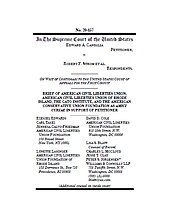Learn more about Cato’s Amicus Briefs Program.
Police officers questioned Edward Caniglia at his home after his wife expressed concern that he might be suicidal. After a local firefighter persuaded Caniglia to go to the hospital, police officers—believing that “Caniglia and others could be in danger”—entered the home and took Caniglia’s guns. The officers’ justification for the entry and seizures was the “community caretaking” exception to the Fourth Amendment’s warrant requirement. The Supreme Court’s first case recognizing that exception, Cady v. Dombrowski, involved officers searching the trunk of a car towed after an accident. Since then, the federal courts of appeals have divided on whether the community-caretaking exception applies to the home or only to motor vehicles. Caniglia sued the city and police officers in federal court arguing that their actions violated the Fourth Amendment. The district court held that the actions were constitutional, and that decision was affirmed by the First Circuit Court of Appeals. The Supreme Court granted certiorari. Cato now joins the ACLU and the American Conservative Union Foundation on a brief urging the Court to put an end to the expansion of the community caretaking standard’s application to the home.

This work is licensed under a Creative Commons Attribution-NonCommercial-ShareAlike 4.0 International License.


